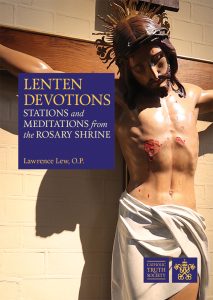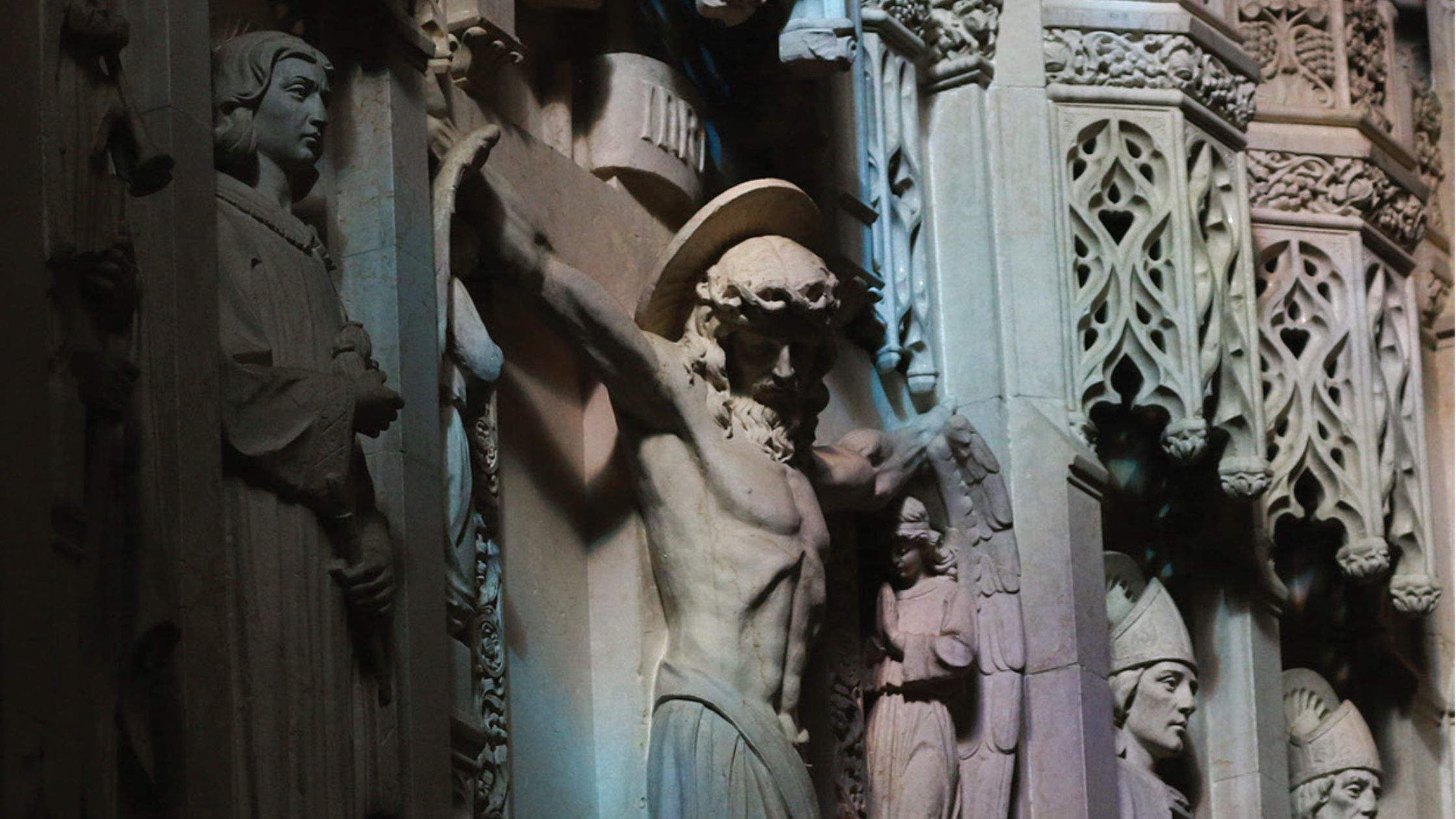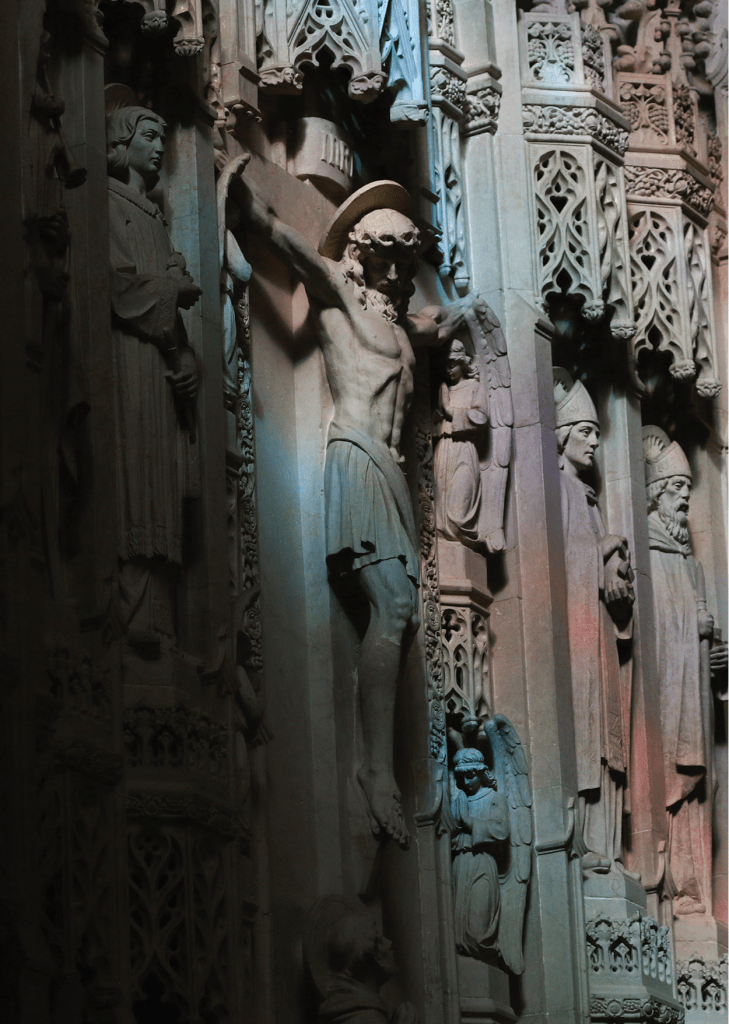The Seven Last Words of Our Lord have, from the sixteenth century, been the subject of meditations of Good Friday. Fr Lawrence Lew OP’s set of reflections, the first of which is presented here, was first preached in Holy Week of 2022, during the Rosary Shrine’s annual “Holy Week Retreat”.
The fifth word (see Jn 19:28):
To all: I thirst.
When I hear these words of Christ, I always think of St Teresa of Kolkata and her Missionaries of Charity. In each of their convent chapels there will be a crucifix behind the altar, and next to the crucifix, these words, the fifth word of the dying Lord Jesus, will have been marked out on the wall: “I thirst”.
Traditionally, the scriptures and the Saints have spoken about the thirst of the human soul for God. Psalm 63, for example, says: “O God you are my God, for you I long, for you my soul is thirsting like a dry weary land without water” (Ps 63:1), and St Augustine famously wrote in his spiritual autobiography that “our hearts are restless until they rest in God”. When I was a teenager, and as I was thinking about becoming a Catholic, both these sentences meant a lot to me. They seemed to speak about my deepest longing for God, my desire to know and experience the love of God, and so I became an inquirer, then a catechumen, and was baptised a Catholic, aged sixteen.
However, even before we can speak of our love, our longings and our desire for God, we must ponder and behold first of all the unfathomable love of God for man: a love that takes him to this day, Good Friday; a love that leads Christ to willingly suffer and be nailed to the cross. St John the Beloved Disciple said: “In this is love, not that we loved God but that he loved us and sent his Son to be the expiation for our sins” (1 Jn 4:10). In going up to the cross, Christ is leading humanity as a shepherd leads his flock, through the “valley of the shadow of death”, and guiding us to the green pastures of paradise (see Ps 22), where he will satisfy the deepest thirst of the human soul: our longing for God, for happiness, for divine love. Jesus promises that “whoever drinks of the water that I shall give him will never thirst; the water that I shall give him will become in him a spring of water welling up to eternal life” (Jn 4:14). So, yes, we can satisfy the thirst, the restlessness, the angst that we experience if we draw near to Christ; rejecting all that dehydrates us, we can “draw water from the wells of salvation” (see Is 12:3).
But drawing close to Christ – going to him and choosing to be with him – not only satisfies our thirst for love, but, more astoundingly, it also satisfies God’s longing for us, for our love. This is how the Saints have understood the thirst of Christ on the cross. As Mother Teresa said in one of her letters to her sisters:
At this most difficult time He proclaimed, “I thirst.” And people thought He was thirsty in an ordinary way, and they gave Him vinegar straight away; but it was not for that which he thirsted – it was for our love, our affection; that intimate attachment to Him, and that sharing of His passion. He used, ‘I thirst’ instead of ‘Give Me your love’… ‘I thirst. ’ Let us hear Him saying it to me and saying it to you.
In every generation, Christ has given us saints to remind us of his thirst for our love, attention and gratitude. To this day, the Lord continues to wait for us to show him our love; he waits for us especially in the Eucharist, in the tabernacle.
In June 1675, Jesus revealed his Sacred Heart to St Margaret Mary Alacoque and said to her:
Behold the Heart which has so loved men that it has spared nothing, even to exhausting and consuming Itself, in order to testify Its love; and in return, I receive from the greater part only ingratitude, by their irreverence and sacrilege, and by the coldness and contempt they have for Me in the Eucharist. But what I feel most keenly is that it is hearts which are consecrated to Me that treat Me thus.
Hence, it is vital that we who are priests and religious should renew our love for the Eucharist, especially by adoring the Lord in the tabernacle and celebrating Mass with reverence, care and attention. And to all of us, the Lord asks: Will we not come and spend some time with him? Will we not come to church and adore him, love him, speak to him who is exposed on our altar day after day?
Only on this day, Good Friday, of all the days in the year, is the Blessed Sacrament not waiting in the tabernacle of our churches. On this day, the day when we commemorate the Lord’s death, the tabernacle is emptied, and our churches feel somehow devoid of life, emptied of the Presence, museum-like rather than a holy place for a real encounter with the living God. When we come into church without any regard or reverence for the holy and living God who dwells in the tabernacle, we turn this church building into just an empty shell or mere pitiful museum of our fragile memories. Without the Blessed Sacrament, without God, our life becomes emptied of all genuine meaning, and we fade away as a civilisation, as a community, as human beings.
Hence, the psalmist said: “You hide your face, they are dismayed” (Ps 104:29). On this day, Good Friday, the Blessed Sacrament is hidden away from us, and our tabernacles stand empty as a reminder that this greatest of gifts is not to be taken for granted. Rather, he is here for us, to lead us through the “valley of the shadow of death”, to be “the way, the truth and the life for us”, leading us to eternal life. He longs to love us and to help us: he thirsts for us to come to him and to love him, to realise our deep need of him, and so to desire and long for him.
For that is how we are made. As St Augustine said: “You have made us for yourself, and our hearts are restless, until they can find rest in you.” Therefore, from the tabernacle, in the Holy Eucharist, Christ calls out to us again and again: “Come to me, all who labour and are heavy laden, and I will give you rest. Take my yoke upon you, and learn from me; for I am gentle and lowly in heart, and you will find rest for your souls” (Mt 11:28-29). Daily, the Lord invites us to rest in him. At least once a week, on Sunday, he invites us to be at rest by coming to Holy Mass and giving that time and our attention, as far as is humanly possible, to him.
Christ thirsts for the chance to satisfy the deepest hunger of the human heart. He thirsts to give himself to you in the Eucharist. He thirsts for you to come to him and to let him love you.
Hence Mother Teresa wrote:
Jesus wants me to tell you again, especially in this Holy Week, how much love He has for each one of you – beyond all you can imagine. I worry some of you still have not really met Jesus – one to one – you and Jesus alone. We may spend time in chapel – but have you seen with the eyes of your soul how He looks at you with love? Do you really know the living Jesus – not from books but from being with Him in your heart? Have you heard the loving words He speaks to you? Ask for the grace, He is longing to give it. Until you can hear Jesus in the silence of your own heart, you will not be able to hear Him saying “I thirst” in the hearts of the poor…
Be careful of all that can block that personal contact with the living Jesus. The Devil may try to use the hurts of life, and sometimes our own mistakes – to make you feel it is impossible that Jesus really loves you, is really cleaving to you. This is a danger for all of us. And so sad, because it is completely opposite of what Jesus is really wanting, waiting to tell you. Not only that He loves you, but even more – He longs for you. He misses you when you don’t come close. He thirsts for you. He loves you always, even when you don’t feel worthy. When not accepted by others, even by yourself sometimes – He is the one who always accepts you. My children, you don’t have to be different for Jesus to love you. Only believe – You are precious to Him. Bring all you are suffering to His feet – only open your heart to be loved by Him as you are.
Let us end with the prayer that the Angel of Peace taught to the holy children of Fatima:
“My God, I believe, I adore, I hope and I love Thee! I ask pardon for those who do not believe, do not adore, do not hope and do not love Thee.”
 This reflection is extracted from our book Lenten Devotions: Stations and Meditations from the Rosary Shrine. Fr Lawrence Lew OP offers three powerful Lenten devotions: Stations of the Cross featuring photographs and meditations, the Canticle of the Passion based on words revealed to St Catherine de Ricci, and recollections on the seven last words of Jesus on the Cross.
This reflection is extracted from our book Lenten Devotions: Stations and Meditations from the Rosary Shrine. Fr Lawrence Lew OP offers three powerful Lenten devotions: Stations of the Cross featuring photographs and meditations, the Canticle of the Passion based on words revealed to St Catherine de Ricci, and recollections on the seven last words of Jesus on the Cross.
Find more powerful Lenten devotions and reflections, and support the mission of CTS, by ordering your copy of Lenten Devotions today.

